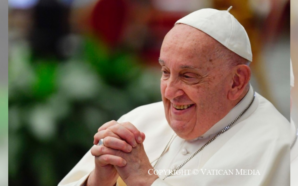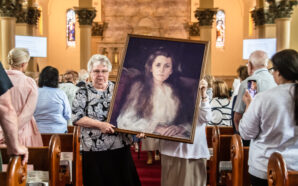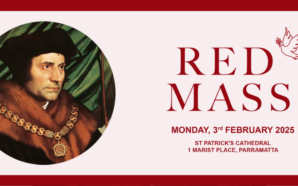Homily for the 12th Sunday in Ordinary Time Year A
Readings: Jeremiah 20:10-13; Psalm 68(69):8-10, 14, 17, 33-35; Romans 5:12-15; Matthew 10:26-33
25 June 2023
On Thursday, we celebrated the feast of Thomas More. Fifteen months before he was finally executed, More was summoned before four commissioners including Thomas Cromwell and asked to swear the oath. Ever the lawyer, More asked not only for a copy of the oath but also the Act of Succession. Having compared them, scrutinising the fine print, he declared:
“My purpose is not to put any fault either in the Act or any man that made it, or in the oath or any man that swears it, nor to condemn the conscience of any other man. But as for myself, in good faith my conscience moves me in the matter, that though I will not deny to swear the succession, yet unto the oath that here is offered to me I cannot swear without the jeoparding of my soul to permanent damnation.”[1]
LISTEN: https://soundcloud.com/frank-brennan-6/homily-25623
For More, process, precision and conscience all mattered. Right process and precise words could reduce the risk of conflict and the need for perilous conscientious objection. He went on to say:
“If you doubt that I do refuse the oath only for the grudge of my conscience, or any other fantasy, I am ready here to satisfy you by my oath. Which if you do not trust it, why should you be the better to give me any oath? And if you trust that I will herein swear true, then I trust of your goodness you will not move me to swear the oath you had offered me, perceiving that for me to swear it is against my conscience.”[2]
Ultimately, the time would come for More to speak his mind. As Jesus says in today’s gospel: “Fear no one. Nothing is concealed that will not be revealed, nor secret that will not be known. What I say to you in the darkness, speak in the light; what you hear whispered, proclaim on the housetops.”
On Monday, the Parliament passed the legislation necessary for the referendum on the Voice. And on the feast of Thomas More, the Parliament rounded out a week of nastiness and obfuscation in Question Time with a completely unreconciled debate about the Voice. It’s now up to each of us to decide how we should vote, how we will vote.
Had there been greater precision and better process from our elected leaders, each of us would undoubtedly have a much easier decision to make in October when deciding to vote yes or no. The abuse of parliamentary process, the imprecision of wording and the fudging of arguments have made the choice more difficult for many voters.
I was one Australian who was delighted that the new Albanese government was committed to doing something about constitutional recognition of Australia’s First Peoples. The issue has lingered too long. I had every sympathy for a new Labor Prime Minister committed to constitutional recognition of the Voice, seeking a circuit breaker after three Liberal Prime Ministers in a row had said ‘No’. I applauded Mr Albanese making a fresh start with his announcement at the Garma Festival in July 2022 when he announced three draft provisions for inclusion in the Constitution and a draft question for the referendum. He told us: “We can use this question – and the provisions – as the basis for further consultation. Not as a final decision but as the basis for dialogue, something to give the conversation shape and form. I ask all Australians of goodwill to engage on this.”[3] I was one who was very happy to step up and engage. I thought his proposed wording needed close attention.[4]
To give the Prime Minister his due, he then chose 21 Indigenous leaders with whom he dealt closely in fine tuning the proposed wording. But he set up absolutely no process for the engagement of ‘all Australians of goodwill’. He did nothing to bring the Coalition parties into the tent.
As an Australian of goodwill who was worried after three months of government dealing only with its selected advisers, I wrote to the Prime Minister very respectfully on 9 November 2022 saying: “As a non-Indigenous Australian with a longtime commitment to constitutional recognition, could I put two suggestions: (1) Now is the time to set up a parliamentary committee process allowing anyone and everyone to have their ‘say’ on the proposed words of amendment to place in the Constitution; (2) Now is the time to return to formal bipartisan co-operation between the Prime Minister and the Leader of the Opposition so as to maximise the prospect of Coalition support for the referendum.”
No parliamentary committee process was set up until 4 April 2023 – after the Bill with the final wording had been introduced to Parliament. By that time, both the National Party and the Liberal Party had closed the door, committing themselves to a ‘No’ vote.
One of the key Liberals who is a strong supporter of the Voice and who participated in the parliamentary committee rightly said, “The committee process we had was a joke. It did not provide a proper opportunity to improve the wording. I mean, the idea that this wording is perfect, I think, is intellectually insincere.”[5] He then told Parliament:
”I think it was a bad process, mainly because there was no effort put into trying to develop a set of words by the parliament. Rather, what was given to the committee was a government bill. We were asked to review a government bill in five weeks, which was a policy of the government.” He said, “The idea that the way the Voice has been drafted in this bill is perfect is intellectually unsound.”[6]
During this last week, the government has made vain, belated efforts to limit the scope of the new wording proposed for the Constitution, urging us all to read the Attorney General’s second reading speech. The government knows that a minister’s speech does nothing to impose limitations on the scope of broad language in a proposed constitutional change.[7]
These last weeks when the wording was finally placed under light of day in the Parliament, the government could not afford to consider any change of wording because it wanted to keep faith with its 21 confidential advisers. For its part, the Opposition would not consider any amendments lest a change to the wording make a defeat of the proposal less likely. Our elected leaders have been playing roulette with the country’s soul.
The confidential processes for determining the final language of the amendment and the government’s intractable unwillingness to consider alternative wording during the parliamentary process placed extra lead in the ‘Yes’ saddle bags while at the same time providing much unnecessary ammunition to the ‘No’ camp.[8]
The wording of the change to the Australian Constitution is imperfect. It could have been improved with a more inclusive, more protracted parliamentary process. But Parliament has now completed its legislative task with last week’s nasty debate which did little credit to either side of the political chamber.
We the people now have a clear choice in October. We can vote ‘No’ to a constitutionally enshrined Voice – either because we continue to think that all constitutional entitlements should be held ‘in common with all other Australians’[9] or because we are not convinced that the Voice will work effectively. Or we can vote ‘Yes’ because, whatever the imperfections of the wording and the risk of future complications, we think it is high time that Australia’s First Peoples be recognised in the Constitution in a manner sought and approved by a broad cross-section of Indigenous leaders.
Regardless of the shortcomings of our Parliament and the imperfect wording of the amendment, I will be voting ‘Yes’, and I say that unequivocally. For me, it’s time to own and admit the imperfections, while still committing to ‘Yes’.
We all need to do what we can to help our fellow citizens vote conscientiously. Many have already decided to vote ‘Yes’ regardless of any imperfections. Many have already decided to vote ‘No’ regardless of the compelling arguments put by many Indigenous leaders. But many are undecided. Many of the undecided don’t want slick slogans or adverse judgments on their character. They want reliable information and respect. Let’s hope the country can still get to ‘Yes’ despite the failings in process and precision. By now, we should have been much closer to ‘Yes’ than we are. May the conscience of Thomas More inspire and sustain us on this next part of the journey which risks being as dreadful, dreary and divisive as was much of our parliament’s carry-on this past week.
Let’s pray with the psalmist:
R: Lord, in your great love, answer me.
I pray to you, O LORD,
for the time of your favour, O God!
In your great kindness answer me
with your constant help.
Answer me, O LORD, for bounteous is your kindness;
in your great mercy turn toward me.
R: Lord, in your great love, answer me.
‘See, you lowly ones, and be glad;
you who seek God, may your hearts revive!
For the LORD hears the poor,
and his own who are in bonds he spurns not.
Let the heavens and the earth praise him,
the seas and whatever moves in them!’
R: Lord, in your great love, answer me.
Fr Frank Brennan SJ is the Rector of Newman College, Melbourne, and the former CEO of Catholic Social Services Australia (CSSA).
[1] Ackroyd, P: The Life of Thomas More, Doubleday, 1998, pp360-1.
[2] Ibid, p. 361.
[3] See https://www.pm.gov.au/media/address-garma-festival
[4] Listen to my remarks on 21 February 2023 at https://www.2gb.com/can-the-voice-be-rescued-father-frank-brennan-enters-the-debate/
[5] See https://www.andrewbragg.com/post/interview-with-hamish-macdonald-on-rn-breakfast
[6] Senate, Hansard, 13 June 2023, p. 64.
[7] See Justices Hayne and Gummow in Kartinyeri v Commonwealth (1998) 195 Commonwealth Law Reports 377 at pp. 382-3.
[8] See https://www.youtube.com/watch?v=AWKcYDtfuPA
[9] See House of Representatives, Hansard, 23 August 1988, p. 137.








